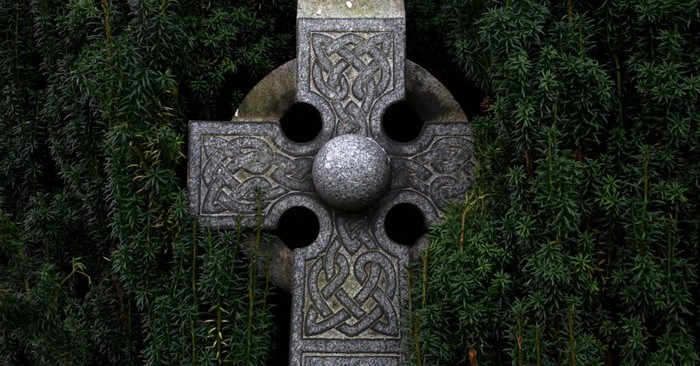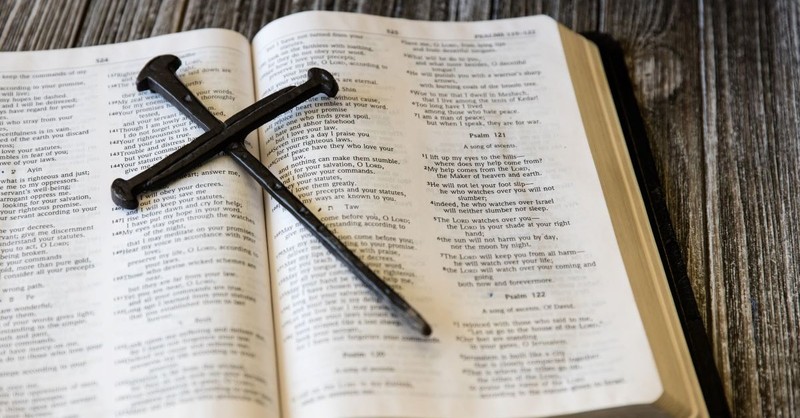
Over 2000 years ago, a man named Jesus Christ of Nazarene died on a cross for the salvation of Jews and Gentiles alike. Today, we, too, celebrate two days before Easter Sunday in the United States, Good Friday. A beautiful way to reflect and meditate on His sacrifice on Good Friday is with hymns and worship songs.
Contrary to the name, Good Friday is a day commemorated to the crucifixion and death of Jesus. As a solemn day, often observed with fasting, Holy Friday represents the anniversary of not only His death but, more importantly, the crutch of Christianity through His resurrection. A beautiful way to reflect and meditate on His sacrifice on Good Friday is with hymns and worship songs. As you listen, remember the amazing love of our Savior, the victory over sin, and the new life that is available to you!
Paul tells us in 1 Corinthians 15:12-23 the entire premise on which this day is based:
"But if it is preached that Christ has been raised from the dead, how can some of you say that there is no resurrection of the dead? If there is no resurrection of the dead, then not even Christ has been raised. And if Christ has not been raised, our preaching is worthless, and so is your faith. In that case, we are also exposed as false witnesses about God. For we have testified about God that He raised Christ from the dead, but He did not raise Him if in fact the dead are not raised... (Read full passage here.)
Because of His death, we can live, and this Good Friday, it's time to worship, praise, and reflect on what this story of redemption means for each of us today.
Here are 10 hymns and worship songs to celebrate the fact that because He lives, I can face tomorrow, long after Good Friday is gone and a new day has come.
Photo Credit: © Adrian Moran

1. "Were You There" by William Eleazar Barton (1899)
As a spiritual piece published in 1899, William Eleazar Barton knew what it meant to suffer great oppression and hardship. Representing enslaved African Americans in the 19th century, "Were You There (When They Crucified My Lord)" has rich parallelism to Christ's crucifixion as well as the pain bound to those in slavery.
With imagery of the horrific death Christ faced on the cross, Barton aimed to relate the darkness of the Lord's last days on earth to the betrayal that many African American's have faced (and still face) for centuries.
Not only does this song remind us that Christ and the celebration of His story are for all generations, but all nationalities, shapes, sizes, and origins.
None of us were at the cross when Jesus died, but every day since then, we have the freedom to die to ourselves and live for Him. Though we cannot see Him physically, know that He and the release of all oppression that He brings reside within you.
"Yet a little while and the world will see me no more, but you will see me. Because I live, you also will live. In that day you will know that I am in my Father, and you in me, and I in you. Whoever has my commandments and keeps them, he it is who loves me. And he who loves me will be loved by my Father, and I will love him and manifest myself to him." (John 14:19-21, ESV)
Photo Credit: © Getty Images/kckate16
Source: The Village Chapel

2. "How Great Thou Art" by Carl Boberg (1886)
While many may have forgotten the name, Swedish Pastor Carl Boberg is the pen behind the ever so sweet words of the traditional hymn "How Great Thou Art." Boberg's inspiration came from a stark encounter with a thunderstorm on Sweden's southeastern coast. Boberg's cries have since been translated and modified by various hymnologists with ambiguity and apprehension to translate the story of creation and human redemption.
"All the nations you have made shall come and worship before you, O Lord, and shall glorify your name. For you are great and do wondrous things; you alone are God" (Psalm 86:9-10, ESV).
Source: DrCheezyToe
3. "It Is Well" Horatio G. Spafford (1873)
In the 1870s, Spafford was a successful businessman and lawyer with a flourishing family. Despite their earthly gains, however, the family had also grown accustomed to many treacherous sorrows. After their son died of pneumonia in 1871, Spafford's wife and four daughters boarded a 313 passenger ship to Europe, where he would meet them once he'd finished some business matters at home.
However, in four days, the boat with Spafford's family collided with a Scottish vessel. Kneeling, the mother and children prayed to God to save them, but for His will to be done. After twelve minutes, the children sunk below the water, and Anna, his wife, was later found floating and hanging onto a wreckage piece. Of the other survivors was a Pastor that spoke with Anna and recalled her stating that though God had given her four daughters, they'd been taken from her, and someday, she'd understand why.
Spafford and Anna were eventually reunited and gave birth to another daughter many years later. After the birth of this child, he wrote, "It Is Well With My Soul." From a place of sorrow, these words recount God giving His Son, and the cup took for His Will to be done.
"And he said, "Naked I came from my mother's womb, and naked shall I return. The Lord gave, and the Lord has taken away; blessed be the name of the Lord." (Job 1:21, ESV)
Photo Credit: © Joshua Earle
Source: SovereignGraceMusic

4. "Jesus Paid It All" by Elvina Hall (1865)
From unexpected places and perhaps the most startling heartbreak, Elvina Hall attended church one Sunday to find herself in a position of tremendous blessing. While singing in the choir, Hall struggled to focus on the Pastor's message, let alone anything church related. However, in the blink of an eye, her thoughts were transfixed on the cross that Jesus bled and died. Envisioning three rugged crosses on a skylit hill with mighty thunder and horrific majestic beauty, it was this scene that led to her composure of recollection.
During the pastor's final prayer, Hall grabbed her hymn book and fashioned the age-old words to a poem that she later showed her pastor. Instantly, the pastor told Hall that the organist had created a tune earlier that week without lyrics, and the two became one. Mysteriously, Hall always declared that God ordained the song from a place of bewilderment that only He could form.
"For my thoughts are not your thoughts, neither are your ways my ways, declares the Lord." (Isaiah 55:8, ESV)
Source: Steph Macleod
5. "Now Behold The Lamb" by Kirk Franklin (1995)
Choir director, gospel musician, singer, songwriter, and author Kirk Franklin released "Now Behold The Lamb" in 1995 as a classic testament to the beauty that Christ's sacrifice brings for those redeemed by His blood.
Through his passion for Christ's life, death, and the Resurrection of Jesus, Franklin created this piece from his humble beginnings. Straying from the faith as a teen and then returning to the church years later, this content is loved by young and old alike and sings of his assertion of faith. When we come to Christ and are redeemed, we are seen as holy and blameless, period. Despite our many faults, Franklin sings that Jesus takes away our sins and that gift is available for all.
"The next day he saw Jesus coming to him and said, "Behold, the Lamb takes away the sin of the world!" (John 1:29, NASB)
Source: Kirk Franklin
Photo Credit: © Getty Images/Ava_Marie

6. "Amazing Grace" by John Newton (1772)
Perhaps one of the most well-known and loved hymns of all time, "Amazing Grace" highlights what Christians around the world celebrate every time they think of the gift they've received through Jesus Christ.
John Newton had a difficult life and rather unfortunate childhood. As a child, Newton fought his family, attempted to desert the Navy, and was abandoned by his crew in West Africa before becoming a servant to a slave trader. While he was eventually rescued, it was on his return voyage to England that a storm led Netwon to a place between a rock and a hard place, where he cried out to God.
However, Newton became a slave shipmaster and often abused slaves, forgetting his former yet humble position. In 1754, after becoming ill out at sea, Newton gave up his ways and job in holy surrender to the Lord. Ordained as a priest 10 years later, he wrote these words as he fought to abolish the African slave trade.
While many renditions have since been adapted, the theme remains the same: Amazing Grace, we don't deserve, saved a wretch like me.
"The saying is trustworthy and deserving of full acceptance, that Christ Jesus came into the world to save sinners, of whom I am the foremost." (1 Timothy 1:15, ESV)
Photo Credit: © Getty Images
Source: Carrie Underwood

7. "Through It All" by Andraé Crouch (1971)
Son of bi-vocational pastors, Crouch recalls receiving the gift and calling of music as a child when his father was called to lead a church lacking musicians. Playing at the age of 11 and producing many songs, this hit hymn reflected this world's darkness without Christ and the glorious life available to those who choose to believe in Him even amid our most tremendous storms.
Rescuing us from a place from which we could never save ourselves, Crouch faithfully declares that this traditional verse doesn't stop at the saving grace of Jesus, but the power of His resurrection through it all.
As a signature piece of faith and trust, Crouch's words hit home with all who have faced hardship and wonder, "Where Is God?"
I've had many tears and sorrows.
I've had questions for tomorrow.
There have been times when
I didn't know right from wrong.
But in every situation,
God gave me blessed consolation
to let me know my trials
come to make me strong.
"Three times I pleaded with the Lord to take it away from me. But he said to me, “My grace is sufficient for you, for my power is made perfect in weakness.” Therefore I will boast all the more gladly about my weaknesses, so that Christ’s power may rest on me. That is why, for Christ’s sake, I delight in weaknesses, in insults, in hardships, in persecutions, in difficulties. For when I am weak, then I am strong." (2 Corinthians 12:8-10, NASB)
Photo Credit: © Getty Images
Source: New Church Media Ministry

8. "Blessed Assurance" by Fanny Crosby (1873)
As the author of more than 8,000 hymns during her lifetime, Fanny Crosby knew from an early age that God would bless her greatly through the gift of songs and lyrics. Completely blind, Crosby thanked God for all the things she would "see" that the world couldn't because they had vision, and she didn't.
Crosby married a musician and became a mother during her lifetime, though her infant was taken soon before its time. Many years later, Crosby paid a visit to her friend, Mrs. Joseph Knapp, a musician. Playing a quick tune, Knapp asked Crosby what the sounds spoke to her, and behold, "Blessed Assurance" was born.
"Every day I will bless you and praise your name forever and ever." (Psalm 154:2, ESV)
Source: SilentVoiceTV
9. "Washed by the Blood" by Elisha Hoffman (1878)
Though many of us claim that Jesus saved us from the grave and has given us new life and redemption, Hoffman's hit tune asks us to look at our lives and question, "Is Jesus the center of my everything?"
At merely 18 years old, Hoffman composed his first hymn, and as a minister, he would go on to write more than 2000. Appearing first in the 1878 hymnal Spiritual Songs for Gospel Meetings and the Sunday School, Hoffman knew not the immeasurable impact of His questions and the grace the words now sing.
"If we confess our sins, he is faithful and just to forgive us our sins and to cleanse us from all unrighteousness." (1 John 1:9 ESV)
Source: SE Samonte
Photo Credit: © Getty Images

10. "Give Me A Clean Heart" by Margaret Pleasant Douroux (1970)
Minister, publisher, educator, and lover of Christ, Margaret Douroux has written over 100 hymns during her lifetime. In one of her most popular hymns, "Give Me A Clean Heart," Douroux attempted to portray the process of salvation and our transfiguration with Christ from death to life when we ask Him to purify and restore our sinfully stained hearts.
As a lyrical confession, Douroux's hymn is one of the most renowned, and its essential lyrics highlight fundamental, evident truths we need to remind ourselves of daily. Reciting Psalm 51:10 within its melodic tune, the hymn focuses on this verse for reflection and conversation with the Father: "Create in me a pure heart, O God, and renew a steadfast spirit within me" (Psalm 51:10, NIV).
"I have been crucified with Christ. It is no longer I who live, but Christ who lives in me. And the life I now live in the flesh I live by faith in the Son of God, who loved me and gave himself for me" (Galatians 2:20, ESV).
Photo Credit: © Getty Images
Source: Fred Hammond
Bonus 11: "Untitled Hymn (Come to Jesus)" by Chris Rice (2003)
Lover of hymns himself, Rice birthed the "Untitled Hymn" by blending sweet words with poetic imagery. Reminding us of our fallen state before Christ and our sinfulness in need of a Savior, a celebration of life asks us to come to Jesus, and today, I ask that each of us learn to do the same.
"For all have sinned and fall short of the glory of God." (Romans 3:23, ESV)
A Good Friday Prayer
Lord, over 2,000 years ago, your bleeding body hung on the cross to pay for my sins. As a holy, perfect, and spotless lamb, you chose to look each of your betrayers in the eye, including me, and say, "I love you, I choose you, I will redeem you." With hands stretched wide and body disfigured, it was your body broken for us that paid the penalty for sin which we could never repay. Remembering how you pierced your body and shed your blood so we could live, it's the beauty in your resurrection that sets us free.
Because when you said, "It is finished," you meant that all that guilt, shame, and unforgiveness God's wrath would place on each of us was swallowed by you. In an odd shade of bleeding red, your heart said, "No, I will die to love them, and they will rest in eternity with me."
In Jesus' Name,
Amen
Today, and every day, let us be grateful for the testimony of Jesus Christ that lives in each of us, and let our lives be representations of Him to the world far beyond the days of Lenten season, Good Friday, or Easter that has brought us here.
Photo Credit: © Getty Images/Natali_Mis
Source: Chris Rice
Originally published Thursday, 01 April 2021.










